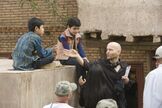In the Melanie Klein school of psychoanalysis, there is a very important analytic theme - the paranoid schizoid. This film interprets a relatively complete personality development process from division to paranoia to integration by showing the staged themes of Amir and Hassan's childhood friendship, relationship breakdown, and adulthood recovery.
Childhood Friendship - A Deep Split in Personality
From a narrow psychoanalytical point of view, Amir's friendship with Hassan is possible because Amir projected Hassan as another part of his personality. Amir kept the character factors such as inferiority complex, cowardice, and kindness in himself, and projected factors such as courage, aggression, and sense of responsibility on Hassan. In this way, a relatively stable relationship was formed.
But what cannot be ignored is that in this relationship, the relationship between the two is extremely unequal (this can be seen from the follow-up Amir who can drive Hassan out with a little trick). It is mainly manifested in two aspects.
One is that in this friendship, Amir completely projects Hassan as an idealized object of himself, ignoring that Hassan is an independent individual in his own right. Children's dreams are often naive and fragile. They believe that the brave should move forward without suffering setbacks. So when Hassan is bullied by the older kids, the perfect object in Amir's mind is shattered, and he discovers the vulnerability of Hassan himself. Turns out Hassan is not a brave angel, but a mortal who also gets bullied. This was unbearable for Amir. He made others the perfect image of the brave because he couldn't stand his own vulnerability. Or because his mother died in childbirth at an early age, he was unable to integrate his aggression and vulnerability. So he leaves his vulnerability behind and projects his aggression onto others (significant others represented by Hassan). But a perfect relationship obviously doesn't last long.
The second is that Amir doesn't trust Hassan, he doesn't trust the relationship, or he doesn't trust himself either. The main color of Amir's personality lies in his vulnerability, inferiority, etc., which also makes Amir dare not fully trust others. He doesn't think Hassan can continue to be brave after being bullied. He is afraid that he will suffer the punishment of "betraying the friendship", so Amir chooses to take the initiative to leave the relationship to avoid punishment.
Broken Relationships - Paranoia of the Vulnerable
If you look at the two people in this friendship from the perspective of a third person, then Amir is the image of a master who just wants to love himself, and Hassan is the image of a constantly dedicated servant who loves others, that is, one is the taker, One is the giver. The two's relationship from establishment to rupture revolves around Amir's paranoid love for himself.
Generally speaking, the more sensitive and vulnerable a person is, the more aggressive they are. If a person is very sensitive and vulnerable, but not aggressive, then he is sick. This disease is called depression.
Amir's psychological motivation for Hassan's false accusation: On the one hand, it comes from a morbid self-protection, that is, as long as I get Hassan away, no one will ever know that I have "succumbed to death" and deliberately hurt my brother; On the other hand, it also comes from the denial of the bad part of myself, that is, I can't do bad things, and I can't do anything that hurts others. So, "As long as I can get Hassan away, I can keep myself vulnerable, sensitive, kind, and at the same time strip the bad things I've done out of my world. Because those bad things make me so guilty, I The fragility of this makes it difficult for me to accept this reality.” In doing so, it serves several purposes.
If we can look outside the relationship again, it is Amir's vulnerability and sensitivity that makes his aggressiveness even more intense. Many vulnerable people can do extreme things to protect themselves, and for good reason.
Rehabilitation in adulthood - toward self-unity in internalization
Anything, as long as it can be spoken, has fluidity, and it is possible to escape from rigidity and fixation.
Projection tests (such as inkblot test, Fang Shuren painting, sand table games, etc.) believe that people's behavior and interpretation of behavior are the results of the projection of the inner world.
Amir's habit of writing stories is a good way to express the unconscious. The self-awareness and understanding are also deepened in the continuous writing. Too often, all we lack is a confirmation, "Am I like this? Oh, I am." That's what makes resonance in a movie or novel so captivating. It does not lie in the creator's subtle creative techniques, but in the inner doubts, a warm feeling of empathy that is confirmed without knowing it.
What is the most charming love story between lovers? — "Do you love me?" "Love. What about you?" "I love you too."
This attempt by me to project my love and get a good feedback is the most beautiful verse in the world.
In adult Amir, the internalization and integration of vulnerability, paranoia, aggression, etc. are already underway. An important sign of becoming more mature from a child is an awareness of the wholeness, unity, and complexity of the world. It is to realize that everything is not black and white, or even black and white. Something can hurt me, but it also becomes a part of me. Instead of judging by simple right and wrong, we start from our own needs and look for more possibilities.
Amir's search for his nephew was also an opportunity for confirmation from fate. The important thing is not to change the past, but to accept the present. Accept my loving wife, accept my exile status, accept my guilt for Hassan, accept my love for Hassan. The suffering that happened in the process undoubtedly made this acceptance more firm and hard-won. This is a bit like a Chinese saying - "Truth in adversity".
So, how to integrate paranoia with division? The trick is not to resolve the conflict, but to accept the paranoia and division itself. For example, Amir is accepting that I am both vulnerable and kind, but also aggressive and may hurt others.
View more about The Kite Runner reviews











